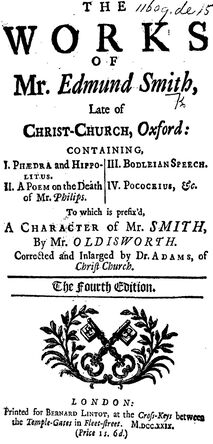
Authority Cited: Smith [Edmund]
Author name and dates: Edmund Smith (1672-1710)
BKG Bio-tweet: Poet of reputation at W&M court; licentious, expelled from Oxford; SJ: possession rather than exertion of uncommon abilities
Categories (list of works cited – preliminary) [BKG Note: About 58 Smith cites in 1755 Dict. vol. 1, about 66 Smith cites in 1755 Dict. vol. 2. Six Smith cites were identified as added in the 1773 Dict., indicated in bold italic below. The Works edition (or separate publications of the Smith citations) used by S.J. is unknown. All citations to "Smith" that were sourced were to the listed poems and are indicated in brackets below. The large majority of cites to "Smith" with no work cited appear to be from Phaedra and Hippolitus. All additions to the 1773 Dict. are from To the Memory of Philips.]
The works of Mr. Edmund Smith, late of Christ-Church, Oxford: Containing, I. Phaedra and Hippolitus. II. A Poem on the Death of Mr. Philips. III. Bodleian Speech. IV. Pocochius, &c. To which is prefix'd, a character of Mr. Smith, by Mr. Oldisworth. Corrected and inlarged by Dr. Adams, of Christ Church, 1729; London: printed for Bernard Lintot, at the Cross-Keys between the Temple-Gates in Fleet-Street
Author name and dates: Edmund Smith (1672-1710)
BKG Bio-tweet: Poet of reputation at W&M court; licentious, expelled from Oxford; SJ: possession rather than exertion of uncommon abilities
Categories (list of works cited – preliminary) [BKG Note: About 58 Smith cites in 1755 Dict. vol. 1, about 66 Smith cites in 1755 Dict. vol. 2. Six Smith cites were identified as added in the 1773 Dict., indicated in bold italic below. The Works edition (or separate publications of the Smith citations) used by S.J. is unknown. All citations to "Smith" that were sourced were to the listed poems and are indicated in brackets below. The large majority of cites to "Smith" with no work cited appear to be from Phaedra and Hippolitus. All additions to the 1773 Dict. are from To the Memory of Philips.]
The works of Mr. Edmund Smith, late of Christ-Church, Oxford: Containing, I. Phaedra and Hippolitus. II. A Poem on the Death of Mr. Philips. III. Bodleian Speech. IV. Pocochius, &c. To which is prefix'd, a character of Mr. Smith, by Mr. Oldisworth. Corrected and inlarged by Dr. Adams, of Christ Church, 1729; London: printed for Bernard Lintot, at the Cross-Keys between the Temple-Gates in Fleet-Street
- Phaedra and Hippol. [Hippolitus]; amaze; away; blush; brandish; bride; brood; but; by; dishevel; [dream (Dedication)];dwell; early; [equal]; express; [forethink]; hagard; hapless; lower; make; off; stand; stick; ungorged; whip; wing; wreath;
- Pocockius in Musae Anglicanae [Musarum Anglicanarum analecta] [BKG Note: a poem in Latin which Johnson mentions in the definition: "To GANCH (GANCH) v.a.[ganciare, from gancio, a hook, Italian; ganche, French.]To drop from a high place upon hooks by way of punishment: a practice in Turkey, to which Smith alludes in his Pocockius. Cohors catenis qua pia stridulis/Gemunt onusti, vel sude trans sinum/Luctantur actâ, pendulive/Sanguineis luctantur in unæs. Musæ Angl."]
- To the Memory of [John] Phillips [Philips]; antique; bawl; below; content; [crutch]; [defend (inexact quote, perhaps from memory)]; [delicious (corrected from Swift in 1755 Dict.)]; [faint]; [far-fetched]; [feeble (same quote as crutch)]; [fire (same quote as faint]; [fustian]; [monkish]; [redstreak]; [ride]; [strong]; unchecked;
- Smith, E. (no work cited); beamy; buskin; chime; clasp; clew; conquer; cough; crash; curdle; dam; dangle; dead; din; disjoint; distort; doom; drag; drug; earthborn; epitaph; equivocate; essay; falter; far-fetched; flagrant; forswear; glow; good; howl; humble; inheritance; jingle; lop; mantle; mark; neigh; noisy; overrun; outstretch; painful; part; perhaps; presence; press; pride; prospect; provocation; rashly; rave; ravenous; reek; remotely; ring; round; shakle; shambling; sharpen; shield; short; shudder; sing; spiritless; startle; stetch (same quote as shakle); struggle; sure; swim; throb; to (2); tusk; vest; unappalled; unknow; unrelenting; unstrung; unsuspicious; untainted; untasting; unutterable; waste; well(-timed); whirl (2); whiten; wreak;